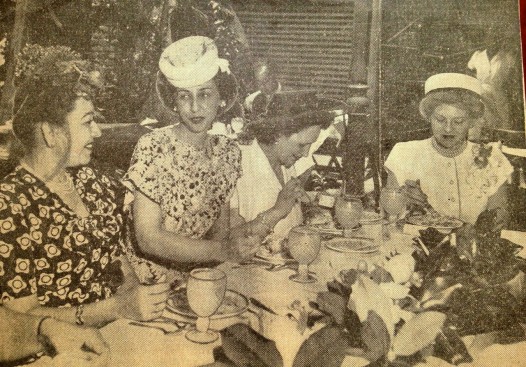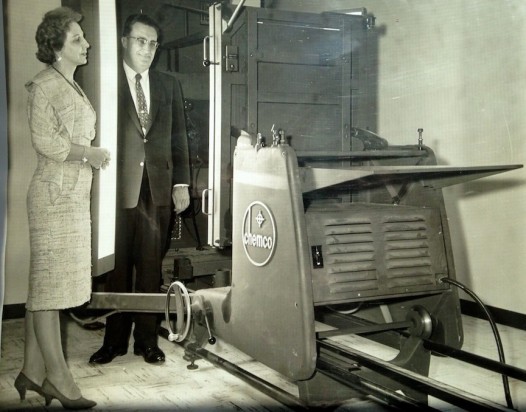
Naomi Marshall chats with the wife of the president of Costa Rica at a luncheon during the inauguration of New Orleans mayor Chep Morrison in 1946.
“It seems that Mrs. Peron is buying up a number of smaller newspapers all over Argentina, and before long everything will be controlled by the government. No one can put their finger on where the money comes for the operation, or where the profit goes.”
Oh, Evita! You had no idea that Naomi Damonte Marshall, who would have turned 100 this Friday, had your number.
My mother, known to our neighbors to the south as “La Mujer del Norte” (the woman from the north), traveled extensively in Latin America on business during those heady days in the 1940s and ’50s, when New Orleans was dubbed “Gateway to the Americas” — long before Miami, Atlanta and Houston opened economic sluices to the south, effectively shutting New Orleans’ wrought-iron-laced gates for years to come.
Mother became interested in the newspaper business through her older sister, Edwina, who headed the advertising art department at The Times-Picayune. She sought out the position of Southern Manager with Chemco Photoproducts, an inventive New York company that had developed innovative equipment for increasing efficiency and profit in the newspaper industry. (Plus ca change, plus c’est la meme chose!)
In 1953, Puerto Rico’s El Mundo headed an interview with La Mujer: “Woman Succeeds in Harmonizing Lives of Business and Family,” recognizing that Mother was always interested in the bottom line, in both domestic and entrepreneurial life.
Continuing her report of Eva Peron’s role in the Argentine government’s growing control over the country’s press, quoted above, she reluctantly advised Chemco’s owners that “(our) U.S. dollars were frozen in the Central Bank about two years ago, and there is little chance of our getting the $2,000.”
Oh, Evita! You took food out of the mouths of Naomi’s sons. For shame!
On her way to prominence in foreign trade, Mother shattered several glass ceilings, becoming the first woman officer of the New Orleans Board of Trade and a member of the city’s Export Managers Club. She was an avid supporter of the original International Trade Mart, a five-story modernist block of offices and displays of foreign government trade offices, spearheaded by Clay Shaw, its first director, which was demolished to make way for the New Orleans Sheraton hotel.
But because International House — the club, not the boutique hotel that now occupies the original building — was for men only at the time, my father, who worked with her in the business, had to join to give her access to its trade missions and other services.

Naomi and a Chemco rollfilm camera in the 1960s.
In the article about her balancing act as mother and executive, the writer mentions as an aside: “She confesses that on some occasions her customers show signs of reluctance to close business transactions with a woman.”
But he ends the piece with her famous recipe for success: “You must act like a woman and think like a man.”
She realized early on that a woman executive, traveling alone in Latin America, would be suspect on a number of levels, including her morality. Jealous spouses might wonder just what was going on in those meetings with government and newspaper officials in places like the Dominican Republic’s “Marble Tower of Journalism,” to which she’d been summoned by a telegram:
“YOUR INTELLIGENT ADVICE NEEDED TO HELP US WITH PLANS FOR MANAGEMENT FOR OUR NEW NEWSPAPER BUILDING.” (NOLA Media Group, take note.)
Or at a seaside casino, where one evening a man walked up and demanded to dance with Mother. When she politely refused, he flashed his government ID. Her companions then flashed their super-high-level ID, and the man fled.
The next morning, when she inquired what had happened to the man, officials just smiled.
She always referred to the off-the-shoulder little white piqué number she’d worn that evening as “My jailhouse dress.”
La Mujer realized that the wives of the officials and executives might think she was after their husbands. So the first thing she did was invite them to lunch for a little girl talk, while still thinking like a man.
Back in New Orleans, she gave luncheons for the wives of “visiting dignitaries” and organized the first plantation tour for these guests at the Mississippi Valley World Trade Conference in the mid-1950s. It was on this tour that she discovered Madewood, which she would purchase 10 years later.
I never landed a front-page story while I was classical music writer at The Times-Picayune, but Mother filed one by phone from Havana during Fulgencio Batista’s 1952 coup.
“‘From my hotel window in the Seville Biltmore — on the Friday,’ she said, ‘I can see armored trucks moving round the palace. Batista’s followers have taken over, and he is due to appear in person at any moment. The crowds are orderly but active, and the atmosphere is tense. Business has practically stopped.'”
No need to cry for Naomi.
Her life was full, including her idea to locate the ITM tower at the foot of Canal Street, rather than in the new Duncan Plaza (City Hall) complex. More on that next week.
In the meantime, Happy 100th Birthday! The truth is, you never left us.
 NOLAbeings Multimedia artist Claire Bangser created NOLAbeings as a portrait-based story project that marries...
NOLAbeings Multimedia artist Claire Bangser created NOLAbeings as a portrait-based story project that marries...  Voodoo in New Orleans: Reviving history: New Orleans fortune telling This article takes a deep dive into the history of Voodoo in New Orleans, its hybridization with Catholicism, and its present-day place in the city's culture. The author visits fortune-tellers in the French Quarter, using their guidance as a tool for introspection rather than a deterministic predictor of the future. Through her experiences in New Orleans, the author feels a mystical connection to both the past and the future.
Voodoo in New Orleans: Reviving history: New Orleans fortune telling This article takes a deep dive into the history of Voodoo in New Orleans, its hybridization with Catholicism, and its present-day place in the city's culture. The author visits fortune-tellers in the French Quarter, using their guidance as a tool for introspection rather than a deterministic predictor of the future. Through her experiences in New Orleans, the author feels a mystical connection to both the past and the future. 